Memories of the attempts of the first BJP-led NDA government at the Centre (1999-2004) to ‘saffronise’ school education are still green. Now with the BJP back in power — this time with an absolute majority in the Lok Sabha — there’s pervasive fear this interrupted agenda will be resumed. Summiya Yasmeen reports
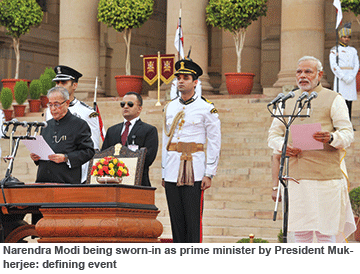 Indisputably the defining event of 2014 was the utter rout of the Congress Party in the General Election of April-May, and the unprecedented victory of the BJP led by its barnstorming former Gujarat chief minister and prime ministerial candidate Narendra Modi. The grand old party, which led the beleaguered UPA-II coalition government at the Centre, was reduced to its lowest ever tally in the Lok Sabha — 44 seats — while the resurgent BJP bagged 282 seats, a majority in its own right. The landslide victory of the BJP-led National Democratic Alliance (NDA) was a decisive mandate against the thoroughly disgraced UPA-II government which passively presided over a series of multi-crore scams, unremitting inflation and legislation logjam in Parliament during its five year term (2009-2014) of office in New Delhi.
Indisputably the defining event of 2014 was the utter rout of the Congress Party in the General Election of April-May, and the unprecedented victory of the BJP led by its barnstorming former Gujarat chief minister and prime ministerial candidate Narendra Modi. The grand old party, which led the beleaguered UPA-II coalition government at the Centre, was reduced to its lowest ever tally in the Lok Sabha — 44 seats — while the resurgent BJP bagged 282 seats, a majority in its own right. The landslide victory of the BJP-led National Democratic Alliance (NDA) was a decisive mandate against the thoroughly disgraced UPA-II government which passively presided over a series of multi-crore scams, unremitting inflation and legislation logjam in Parliament during its five year term (2009-2014) of office in New Delhi.
Typically, in the general election campaigns of all political parties, the pressing issue of reforming India’s moribund education system — notwithstanding the reality that the nation grudgingly hosts the world’s largest child population — was marginalised.
Quite clearly, provision of quality contemporary education to India’s 450 million children below 18 years of age, is not a high priority of any of India’s major political parties. In particular the past five years were uneventful for Indian education with former HRD (human resource development) minister Kapil Sibal failing to push any education legislation barring the Right to Education Act, 2009, through Parliament. And even this belated Act is mired in interpretive confusion and has proved to be beyond the implementation capabilities of state governments.
The massive victory of the BJP, which promised to raise education spending to 6 percent of GDP in its election manifesto, was warily welcomed by Indian academia given the party’s symbiotic relationship with its cultural parent, the Rashtriya Swayamsevak Sangh (RSS), which has a record of interference in school and education curriculums. Memories of the attempts of the first BJP-led NDA government at the Centre to ‘saffronise’ school education during its term in office (1999-2004) are still green. During those years, Union HRD minister and RSS elder Dr. Murli Manohar Joshi commissioned an extensive revision of NCERT social science textbooks to accommodate RSS interpretations of history and Hindu mythology, provoking vigorous protest from academics and opposition parties. Now ten years on, with the BJP back in power — and this time with an absolute majority in the Lok Sabha — there’s pervasive fear this interrupted agenda will be resumed.
As if to confirm these apprehensions, the change of guard at the Centre began on an ominous note for Indian education with the appointment of popular BJP spokesperson and former television soaps star, Smriti Irani as Union HRD minister. Women’s rights activist Madhu Kishwar, a staunch Modi supporter, made a big issue of Irani not being a college graduate which in her (Kishwar’s) opinion disqualified her from heading the HRD ministry. Worse, spokespersons of the routed Congress party highlighted contradictory affidavits filed by Irani with the Election Commission in 2004 in which she had averred she was an arts, and commerce graduate of Delhi University, when she is neither.
Nor have the suspicions about the education agenda of the new BJP-led government at the Centre been allayed by the combative HRD minister. Since assuming charge at Shastri Bhavan on May 27, Irani has provoked considerable controversy by issuing circulars to popularise Hindi and Sanskrit in all schools, and ordering Good Governance Day celebrations to commemorate the birthday of BJP stalwart Atal Bihari Vajpayee on December 25 — Christmas day.
On most of her new initiatives, Irani has been obliged to climb down from her high horse. After bitter opposition from the southern anti-Hindi states, the circular to make Sanskrit, the language of ancient Hindu texts, compulsory in all schools affiliated with the Delhi-based Central Board of Secondary Education (CBSE) — the country’s largest national examinations board which falls under the jurisdictional purview of the HRD ministry — had to be diluted to the status of an “advisory”.
Likewise a recent circular directing all CBSE schools to conduct essay writing and elocution competitions on Christmas Day raised a storm in Parliament with opposition parties accusing the BJP of disrespecting the sentiments of the country’s 24 million-strong Christian community, and promoting the divisive agenda of the RSS. In between dodging the flak, the minister announced that deliberations for drafting a New Education Policy have begun.
While school education was the focus of ill-advised ministerial interventions, there was some good news in higher education. After a lull of over five years, Parliament passed three higher education bills – School of Planning and Architecture Bill, 2014, the Indian Institutes of Information and Technology (IIIT) Bill, 2014, and Central Universities (Amendment) Bill, 2014 — in the winter session (December).
Nevertheless, the education report card for the first six months of the newly elected BJP-led NDA government is less than inspiring and there’s growing suspicion that the new HRD minister is sympathetic to the RSS agenda of promoting hindutva through the education system. Unsurprisingly, the small minority of genuine educationists in academia, and liberals in society fear that the real issues of Indian education — greater budgetary provision for public education, upgrading the crumbling infrastructure of government schools, improving teacher-pupil ratios and rock-bottom learning outcomes, and contemporising curriculums in India’s higher education institutions — will continue to be ignored.
In the following pages, Summiya Yasmeen summarises the education milestone events of 2014. (To access EducationWorld’s coverage of 2014 highlights go to educationworldonline.net archives).
ASER shock
January 15. The Annual Status of Education Report (ASER) 2013 — a nationwide annual survey measuring learning outcomes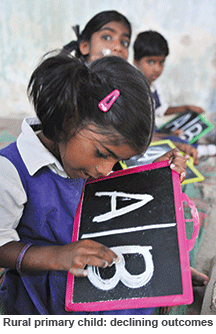 in rural government and private primary schools (classes I-VIII) conducted by the acclaimed Mumbai-based NGO Pratham — was released by Montek Singh Ahluwalia, deputy chairman of the Planning Commission. Conducted by over 25,000 trained volunteers who tested 600,000 children in the age group 3-16 years in 550 districts of 26 states, ASER 2013 reports a continuous learning outcomes decline in primary schools of rural India which hosts 67 percent of the national population.
in rural government and private primary schools (classes I-VIII) conducted by the acclaimed Mumbai-based NGO Pratham — was released by Montek Singh Ahluwalia, deputy chairman of the Planning Commission. Conducted by over 25,000 trained volunteers who tested 600,000 children in the age group 3-16 years in 550 districts of 26 states, ASER 2013 reports a continuous learning outcomes decline in primary schools of rural India which hosts 67 percent of the national population.
Depressingly, ASER 2013 indicates that the percentage of class V children who can read and understand class II textbooks has decreased from an already dismal 52.8 percent in 2009 to a worse 46.9 percent in 2013. Likewise the percentage of class III children who can solve simple subtraction sums has dropped from 33.2 percent in 2010 to a mere 18.9 percent in 2013.
According to ASER 2013, despite increases in Central and state government spending on elementary education under the Sarva Shiksha Abhiyan (SSA), Right to Education (RTE) Act, 2009, and imposition of a 2 percent education cess on taxpayers, there’s a steady flight of students from government to private primaries, and greater reliance on private tuitions to improve children’s learning outcomes. “The guarantee of education is meaningless if there is no satisfactory learning. There are serious implications for India’s equity and growth if basic learning outcomes do not improve soon,” warn the authors of ASER 2013. (Education News, EW February)
Delhi nursery admissions setback
January 20. The Delhi high court dismissed a writ seeking a stay of the lieutenant governor’s nursery admission guidelines of December 18 which abolished the 20 percent discretionary admission quota of the managements of composite schools. In Action Committee of Unaided Recognised Private Schools vs. Lt. Governor & Ors, the court ruled that withdrawing the guidelines would be “detrimental to the interest of children as well as parents”.
Private unaided school managements in the national capital had argued that the lieutenant governor’s nursery admission guidelines were arbitrary and contradicted the Ganguly Committee’s recommendations which had prescribed an elaborate system of points on which schools should base their admission decisions, and abridged their constitutional right to devise their own admission criteria. (Education News, EW February & April)
Interim budget hikes education outlay
February 17. Union finance minister P. Chidambaram presented the UPA-II government’s interim vote-on-account (budget) for fiscal 2014-15 to Parliament. In the pre-election budget, Chidambaram increased allocation to the education sector by a nominal 9 percent. The minister proposed an outlay of Rs.67,398 crore — higher education: Rs.16,200 crore and school education: Rs.51,198 crore.
In a patent bid to woo young voters and students who have availed education loans, he also announced an interest waiver on all education loans taken up to March 31, 2009 and on outstanding loans up to December 31, 2013. He proposed to allocate Rs.2,600 crore to fund the loan waiver, which will benefit 900,000 students.
Maharashtra legislation to regulate school fees
March 21. President Pranab Mukherjee gave his assent to the Maharashtra Educational Institutions (Regulation and Collection of Fees) Act, 2011. Under provisions of the Act, fees — including tuition, term, admission, deposit, examination and library -- in government-aided private schools will be regulated by the state government, and of unaided private schools by executive committees comprising parents, teachers and school management representatives. The Act requires all unaided/independent private schools to constitute PTAs (Parent Teacher Associations) which will elect representatives to approve tuition fee increases proposed by school managements.
Most private unaided school managements welcomed the new legislation as it nullifies the power of notoriously corrupt state government education officials to determine the tuition fees of private unaided schools, and vests it in in-house PTAs. (Education News, EW May)
RTE Act fourth anniversary
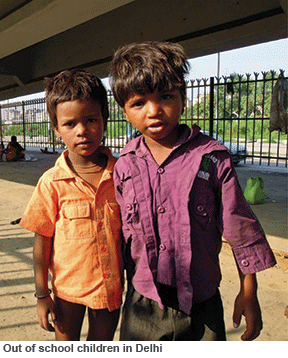 April 1. The landmark Right to Free & Compulsory Education (RTE) Act, 2009, which obliges the State to provide free and compulsory education to every child in the 6-14 age group, completed its fourth anniversary.
April 1. The landmark Right to Free & Compulsory Education (RTE) Act, 2009, which obliges the State to provide free and compulsory education to every child in the 6-14 age group, completed its fourth anniversary.
Although the major political parties, locked in a high-voltage combat to elect members of the 16th Lok Sabha, had little time to mark the occasion, a report of the Delhi-based RTE Forum — a network of 10,000 NGOs and child rights activists — titled 4th year: Status Report on the Implementation of the RTE Act, 2009, revealed that only 8 percent of schools countrywide are compliant with the infrastructure and teacher-pupil norms mandated by s.19 and Schedule of the Act.
“Eight million children continue to be out of school; most school management committees (SMCs) have been established in an undemocratic manner and have not become fully functional; registration of private schools on the basis of compliance with the norms laid down in the Act has hardly begun; and there are serious shortfalls in the recruitment of teachers and shortcomings in facilities for their training,” said the report in a damning indictment of the UPA-II government’s showpiece legislation. (Special Report, EW March & Education News, EW May)
SC medium of instruction verdict
May 6. In a landmark verdict in State of Karnataka & Anr. vs. Associated Managements of (Government Recognised Unaided English Medium) Primary & Secondary Schools & Ors, the Supreme Court upheld a 2008 Karnataka high court judgement which had quashed a state government order issued in 1994 mandating Kannada or mother tongue as the compulsory medium of instruction in all primary schools (classes I-V) statewide. The apex court ruled that imposing any language as the medium of instruction violated the fundamental right of parents and children to choose their preferred language of instruction in school.
“We are of the considered opinion that though the experts may be uniform in their opinion that children studying in classes I-V in primary school can learn better if they are taught in their mother tongue, the State cannot stipulate it as a condition for recognition (of schools)...” ruled the five-judge bench in a unanimous judgement.
While the promoter-owners of Karnataka’s unaided primary schools, who have been contesting the state government’s 1994 medium of instruction directive for over two decades, welcomed the judgement, the Congress-ruled state government proposes to file a curative petition as well as lobby with the Central government for a constitutional amendment. (Education News, EW June)
Smriti Irani appointed HRD minister
May 27. Following the spectacular triumph of the BJP-led NDA coalition in General Election 2014, BJP national spokesperson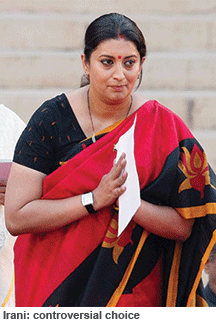 and former television soaps star Smriti Irani was appointed Union human resource development (HRD) minister. However prime minister Narendra Modi’s selection of the inexperienced Irani to head the sensitive and complex HRD ministry evoked strong criticism from the opposition and a section of academics.
and former television soaps star Smriti Irani was appointed Union human resource development (HRD) minister. However prime minister Narendra Modi’s selection of the inexperienced Irani to head the sensitive and complex HRD ministry evoked strong criticism from the opposition and a section of academics.
Criticism notwithstanding, on her first day in office on May 27, Irani promised to increase public spending on education to 6 percent of GDP as stated in the BJP manifesto, and review all legislation related to higher education reform that had lapsed with the dissolution of the 15th Lok Sabha. (Education News, EW June).
Delhi University FYUP rollback
June 27. Cancelling its four year undergraduate programme (FYUP), Delhi University (DU) issued a directive to affiliated colleges to admit students in the 2014-15 academic year “under the scheme of courses that were in the academic session 2012-13”. With the .gif) BJP, which won a landslide victory in General Election 2014, having promised in its manifesto to scrap FYUP, the Central government-funded University Grants Commission (UGC) — the country’s apex higher education regulatory body — which had approved FYUP in 2013, made a supine volte face directing DU to revert to the traditional three-year programme for 2014-15.
BJP, which won a landslide victory in General Election 2014, having promised in its manifesto to scrap FYUP, the Central government-funded University Grants Commission (UGC) — the country’s apex higher education regulatory body — which had approved FYUP in 2013, made a supine volte face directing DU to revert to the traditional three-year programme for 2014-15.
Immediately after Union HRD minister Smriti Irani was sworn-in, a steady stream of DU teacher and student delegations had been meeting with her, pressing for the rollback of FYUP. On June 7, a delegation of the Akhil Bharatiya Vidyarthi Parishad (ABVP), the student wing of the BJP, presented a memorandum demanding withdrawal of FYUP. Earlier on May 30, a delegation of DU teachers and students had presented a similar petition to the new HRD minister, even as the sprawling DU campus transformed into a war zone with pro and anti-FYUP students and teachers’ organisations voicing daily protests. (Special Report, EW July)
Forced Sanskrit week celebrations
June 30. The Delhi-based Central Board of Secondary Education (CBSE) issued a circular directing all its 15,000 affiliated schools countrywide to celebrate Sanskrit Week from August 7-13. The circular advised school managements to organise Sanskrit-based competitions, and teachers to conduct research to explore links between Sanskrit and other Indian languages.
However the circular prompted Tamil Nadu chief minister J. Jayalalithaa (who has since resigned after a Karnataka court indicted her in a corruption case) to write to prime minister Narendra Modi requesting him to “advise the officials of the government of India to suitably modify the letter to enable each state, including CBSE schools in the state to organise celebrations in tune with the language and culture of the state”. Subsequently HRD minister Smriti Irani issued a clarification stating the circular was advisory rather than mandatory. (Education News, EW August & October)
Gujarat government’s textbooks gifting spree
June 30. The Gujarat State School Textbook Board (GSSTB) issued a circular gifting a set of eight books authored by Dina Nath Batra, member of the executive council of Vidya Bharati -- the education wing of the Rashtriya Swayamsevak Sangh (RSS), the Hindu revivalist and cultural organisation and ideological mentor of the BJP -- to 42,000 primary-secondary schools statewide as “supplementary literature”.
This initiative of the BJP state government evoked sharp criticism from academics as Batra’s credentials as a historian and intellectual are questionable. In one of his books endorsed by GSSTB which contains a foreword written by prime minister Narendra Modi, Batra writes that the India map should include Pakistan, Afghanistan, Nepal, Bhutan, Tibet, Bangladesh, Sri Lanka and Burma as they are all a part of Akhand Bharat. In another, he advises against the celebration of birthdays with cakes and candles on the ground that it’s a western practice. (Education News, EW August).
Child rape outrage
July 3. A six-year-old girl child of the upmarket CISCE-affiliated Vibgyor High School in Bangalore was allegedly raped by two school-appointed physical education instructors. After the ghastly crime was reported to the police, Bangalore witnessed strident protests by middle class parents, students and NGOs demanding stringent punishment of the perpetrators, the principal and management of the school.
This heinous atrocity prompted the Karnataka government’s education department and police to issue elaborate safety guidelines for schools. Among them: installation of CCTV cameras in classrooms, compulsory presence of female attendants in school buses, appointment of selected teachers as vigilance officers, photo-identity cards for parents and staff members, restriction of movement of bus and van drivers within school campuses and appointment of additional security guards. Curiously, the safety guidelines are applicable only to the state’s 11,475 private schools which have since been subjected to surprise visits by education department inspectors and/or police personnel demanding implementation of safety measures. (Education News, EW August & December).
Budget 2014-15 ignores education
July 10. Arun Jaitley, Union finance minister in the newly elected NDA government, presented the Union Budget 2014-15 to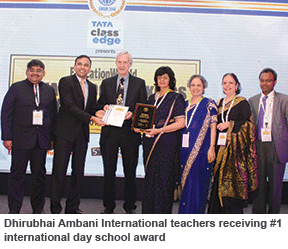 Parliament. In his 2.2-hour budget speech, Jaitley allocated Rs.68,728 crore for education — an increase of a mere 11.1 percent over last fiscal — barely sufficient to cover inflation. School education was allocated Rs.51,828 crore and higher education Rs.16,900 crore. In addition, he proposed the establishment of five more IITs in Jammu and Kashmir, Chhattisgarh, Goa, Andhra Pradesh and Kerala; five IIMs in Himachal Pradesh, Punjab, Bihar, Odisha and Maharashtra; a Jai Prakash Narayan National Centre for Excellence in Humanities in Madhya Pradesh; five new All India Institutes of Medical Sciences and a sports university.
Parliament. In his 2.2-hour budget speech, Jaitley allocated Rs.68,728 crore for education — an increase of a mere 11.1 percent over last fiscal — barely sufficient to cover inflation. School education was allocated Rs.51,828 crore and higher education Rs.16,900 crore. In addition, he proposed the establishment of five more IITs in Jammu and Kashmir, Chhattisgarh, Goa, Andhra Pradesh and Kerala; five IIMs in Himachal Pradesh, Punjab, Bihar, Odisha and Maharashtra; a Jai Prakash Narayan National Centre for Excellence in Humanities in Madhya Pradesh; five new All India Institutes of Medical Sciences and a sports university.
Describing elementary education as “one of the major priorities of the government” he set apart Rs.28,635 crore for the Sarva Shiksha Abhiyan (SSA) programme. The budget also advocated starting a school assessment programme and the Pandit Madan Mohan Malviya New Teachers Training Programme (Rs.500 crore). Moreover the minister allocated Rs.4,966 crore for the Rashtriya Madhyamik Shiksha Abhiyan, a programme to universalise secondary education.
However the timorous 11.1 percent higher allocation for education indicates that the NDA government has no intention of honouring its pledge to raise the national education outlay to 6 percent of GDP, as promised in its election manifesto.
EW India School Rankings 2014
September 7. The Shri Ram School, Delhi/Gurgaon (co-ed), Daly College, Indore (day-cum-boarding), La Martiniere for Girls, Kolkata (all-girls) and Campion School, Mumbai (all-boys) were ranked India’s most admired day schools in the EducationWorld India School Rankings 2014.
Sahyadri School, Pune (co-ed), Welham Girls, Dehradun (all-girls), and Bishop Cotton Boys School, Shimla (all-boys) were ranked #1 in the traditional/legacy boarding schools category. Dhirubhai Ambani International, Mumbai (day), Indus International, Bangalore (day-cum-boarding) and Kodaikanal International School (fully residential) were voted #1 in the international schools category.
A total of 8,263 SEC A fees-paying parents, teachers, principals and educationists in 25 cities countrywide were interviewed by 203 field researchers of the well-reputed market research and opinion polls company Centre for Forecasting Pvt. Ltd (C fore), Delhi to rate and rank 704 of the country’s most well-known day, 84 boarding and 63 international primary-secondary schools. (Cover story, EW September).
Jadavpur students protest crackdown
.gif) September 16. The Kolkata police forcefully suppressed a students protest in West Bengal’s top-ranked Jadavpur University (JU). The protesting students were demanding an independent investigation into a case of molestation of a woman student inside the campus on August 28. According to police sources, a group of 200 students had gheraoed interim vice chancellor Abhijit Chakraborty and 12 members of the executive council, confining them in the VC’s office for over 12 hours. Consequently Chakraborty called in the police who lathi-charged the protesting students, injuring and hospitalising 30 and arresting 36.
September 16. The Kolkata police forcefully suppressed a students protest in West Bengal’s top-ranked Jadavpur University (JU). The protesting students were demanding an independent investigation into a case of molestation of a woman student inside the campus on August 28. According to police sources, a group of 200 students had gheraoed interim vice chancellor Abhijit Chakraborty and 12 members of the executive council, confining them in the VC’s office for over 12 hours. Consequently Chakraborty called in the police who lathi-charged the protesting students, injuring and hospitalising 30 and arresting 36.
The excessive force employed by the police against JU students outraged Kolkata’s citizenry, prompting more than 50,000 citizens to participate in a protest rally on September 20 which demanded Chakraborty’s resignation. Public opinion was further outraged by chief minister Mamata Banerjee’s dismissal of the brutal assault on the protesting students as a “small incident”, and the state government’s confirmation of Chakraborty as VC.
Over October-November, students, professors and alumni of Jadavpur University, civil society members and a host of political leaders, continued to protest against the state government, and demanded Chakraborty’s resignation. (Education News, EW October).
Centre withdraws NCHER Bill
September 24. The new BJP-led NDA government at the Centre withdrew the National Commission for Higher Education & Research (NCHER) Bill, 2011. The Bill proposed the establishment of a supra council for higher education subsuming the University Grants Commission (UGC), All India Council for Technical Education (AICTE), and the National Council for Teacher Education (NCTE).
A statement of the new BJP-led government said that instead, the new government will restructure and empower UGC as per the recommendations of a UGC review committee, appointed by it on July 30.
With the withdrawal of the NCHER Bill, the idea of establishing a national over-arching regulatory body for higher education, first mooted by the Sam Pitroda-led National Knowledge Commission in 2007 and endorsed in detail by the Yash Pal Committee on Renovation & Rejuvenation of Higher Education in 2009, which became the basis for the NCHER Bill, the brainchild legislation of former Union HRD minister Kapil Sibal, has been dropped. (Education News, EW October).
Sanskrit to replace German in KVs
October 27. The board of governors of the Kendriya Vidyalaya Sangathan, headed by Union HRD minister Smriti Irani, resolved that “teaching of German language as an option to Sanskrit will be discontinued herewith” in over 1,000 Central government-funded Kendriya Vidyalaya (KV) schools countrywide. According to Irani, teaching German as the third language violates the National Education Policy and the three language formula which mandates that schools should teach Hindi, English and one other Indian language.
This decision taken in the middle of the academic year, and likely to adversely impact over 68,000 class VI-VIII KV students, was heavily criticised by opposition parties and parents. Following a petition filed by a group of 20 parents in the Supreme Court seeking a stay of the directive, the HRD ministry decided against conducting the annual Sanskrit exam this academic year to ensure “no stress is caused to the students due to introduction of Sanskrit mid-session”.
Parliament passes three higher ed bills
December 1. The Rajya Sabha unanimously passed the Indian Institutes of Information and Technology (IIIT) Bill, 2014, which 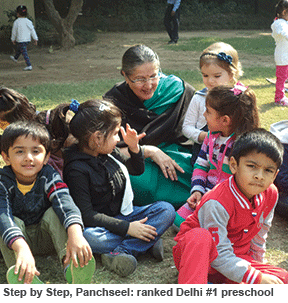 designates the country’s four IIITs as institutes of national importance with independent statutory status and degree awarding powers. Two days later, the Lok Sabha passed the School of Planning and Architecture Bill, 2014, which provides for conversion of the country’s three Schools of Planning and Architecture (in Delhi, Vijayawada and Bhopal) into centres of excellence with degree awarding powers, and the Central Universities (Amendment) Bill, 2014. The latter Bill proposes the establishment of a new Central university — Mahatma Gandhi Central University — in Motihari in the East Champaran district of Bihar.
designates the country’s four IIITs as institutes of national importance with independent statutory status and degree awarding powers. Two days later, the Lok Sabha passed the School of Planning and Architecture Bill, 2014, which provides for conversion of the country’s three Schools of Planning and Architecture (in Delhi, Vijayawada and Bhopal) into centres of excellence with degree awarding powers, and the Central Universities (Amendment) Bill, 2014. The latter Bill proposes the establishment of a new Central university — Mahatma Gandhi Central University — in Motihari in the East Champaran district of Bihar.
The enactment of three higher education bills after a lull of more than five years — the UPA-II government was unable to pass even one higher education legislation through Parliament during its five-year term — was welcomed by educationists and academia.
EW India Preschool Rankings
December 7. Step by Step, Panchsheel and The Magic Years, Vasant Vihar (Delhi); Indus Early Learning Centre, Whitefield (Bangalore); Kangaroo Kids, Banjara Hills (Hyderabad); Kangaroo Kids, Bandra (Mumbai); Mongrace Montessori House, Short Street (Kolkata); Vruksha Montessori, Alwarpet (Chennai); Leapbridge International Preschool, Kalyani Nagar (Pune); EuroKids, Satellite (Ahmedabad); Pallavan, Sohna Road/DLF Phase I (Gurgaon), and Windows Play Group & Nursery School, Sector 50 (Noida), were adjudged the most admired preschools in India.
The fourth annual EducationWorld India Preschool Rankings (2014) rated and ranked 173 selected independent preschools in ten cities — where awareness of the vital importance of foundational early childhood care and education is highest. To conduct the survey, over 200 field researchers of the Delhi-based market research agency C fore quizzed 3,127 respondents including parents (with at least one child in preschool), teachers and principals, asking them to rate the 173 preschools on ten parameters of education excellence. (Cover story, EW December).
Good Governance Day celebrations row
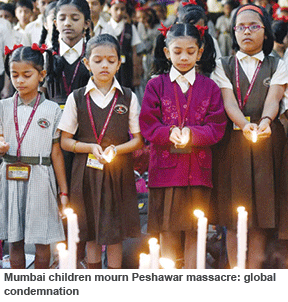 December 9. The Union HRD ministry issued yet another controversial circular directing all CBSE-affiliated schools to celebrate December 25 (Christmas) as Good Governance Day to mark the birthday of BJP stalwarts Atal Bihari Vajpayee and Madan Mohan Malviya. Three days later a similar circular was issued to all Central universities and AICTE recognised professional colleges. Schools and colleges were advised to conduct quiz competitions, debates, essay writing contests, and screen documentaries and films on issues related to good governance. Moreover the circular directed schools to submit “a detailed report on the activities undertaken along with photographs and video recordings” to the ministry.
December 9. The Union HRD ministry issued yet another controversial circular directing all CBSE-affiliated schools to celebrate December 25 (Christmas) as Good Governance Day to mark the birthday of BJP stalwarts Atal Bihari Vajpayee and Madan Mohan Malviya. Three days later a similar circular was issued to all Central universities and AICTE recognised professional colleges. Schools and colleges were advised to conduct quiz competitions, debates, essay writing contests, and screen documentaries and films on issues related to good governance. Moreover the circular directed schools to submit “a detailed report on the activities undertaken along with photographs and video recordings” to the ministry.
The circulars provoked a storm in Parliament with the opposition parties accusing the BJP of hurting the sentiments of the country’s 24 million Christian citizens by directing education institutions to work on Christmas day, traditionally a holiday.
Confronted with nationwide criticism, the HRD ministry was forced to retract and issued a denial stating that “CBSE has not directed any school to remain open on 25th December, 2014. The proposed instructions of the CBSE are to conduct an online essay competition on 24th and 25th December 2014, which is completely voluntary.”
Peshawar school tragedy
December 17. Taliban terrorists gunned down 145 children of the Army Public School, Peshawar, in neighbouring Pakistan. Seven terrorists of the Tehreek-e-Taliban stormed into the school and sprayed machine-gun fire on 12-16-year-old children cowering behind their desks. By the time the nine-hour siege ended, 145 people including the terrorists were killed. It was the worst attack on children anywhere in the world since the Beslan mass killing by Chechen Islamist rebels in 2004.
The savage and ghastly massacre of school children evoked outright condemnation worldwide, particularly in India where school and other students held candlelight vigils.